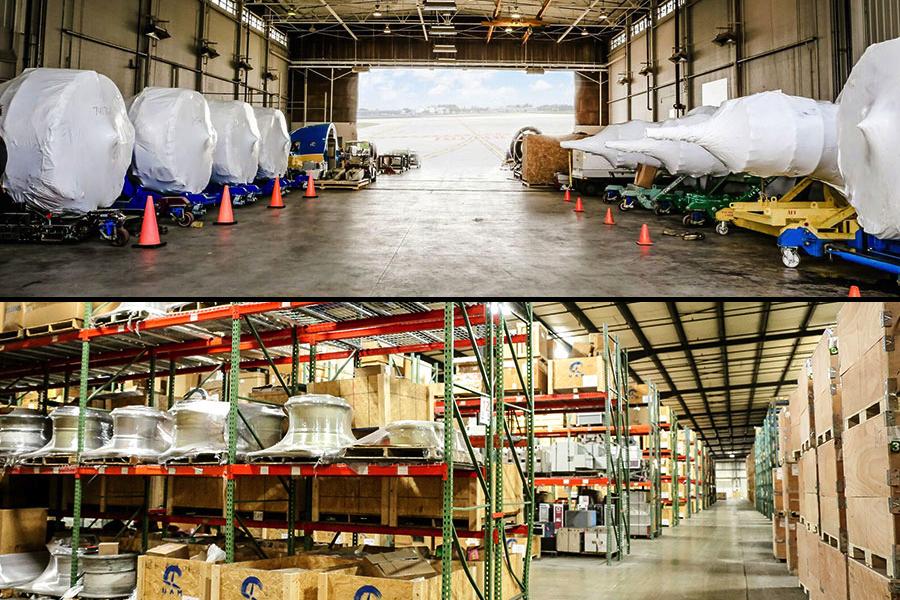
Aircraft disassemblers from outside China may soon gain the ability to sell used parts in the country after being previously stifled by regulations. The Aircraft Fleet Recycling Association (AFRA) is working with the Aviation Suppliers Association (ASA) on a possible solution that would satisfy the Civil Aviation Administration of China (CAAC) and open the Chinese used parts market to the global marketplace.
During a virtual AFRA member meeting on Aug. 26, Jason Dickstein, president of Washington Aviation Group—which represents both AFRA and ASA’s interest before government—described how the current situation is impeding most aircraft teardown providers.
“Right now, Chinese law requires that if you’ve got a disassembled part removed from an aircraft and it’s intended to be reinstalled into a Chinese registered aircraft, it has to meet certain requirements,” said Dickstein. The part must be removed by a Chinese certificated repair station (CCAR 145) and entered into a Civil Aviation Maintenance Association of China (CAMAC) database. It must then be overhauled by a CCAR 145 repair station and verified in the CAMAC database.
“This is inhibiting a lot of global commerce because most disassemblers around the world are not CCAR 145 repair stations and, therefore, they are removing parts, but those good parts can’t come into the Chinese system,” noted Dickstein. He adds that this especially impacts parts that were removed before the CAMAC database existed, even though they are still capable of being overhauled under CCAR 145 standards.
Dickstein previously detailed these challenges at the ILS Connect Virtual conference in June, pointing out that only a handful of companies—all of which are based in China—had authority under Chinese law to do these sorts of part-outs.
AFRA and ASA are now working with the Chinese government on a solution under which CAAC would recognize AFRA as a source of accreditation for part-removing entities. The organizations plan to petition CAAC to recognize that companies accredited to AFRA BMP (“AFRA Best Management Practice for Management of Used Aircraft Parts and Assemblies and for Recycling of Aircraft Materials”) can be acceptable sources for disassembling parts.
Dickstein says there is “tremendous commonality” between current CAAC requirements and AFRA BMP requirements, with most differences pertaining to technical and paperwork issues. “Our BMP is specific to the aviation asset disassembly process, so we’re actually better targeted than a repair station regulation on affecting safety and environmentally friendly behavior in the disassembly process,” he added.
Dickstein says the precedent for this proposed solution is CAAC’s recognition last year of ASA’s quality system standard for assessment of aircraft materials distributors for use under Chinese law.
“If we can create this partnership between AFRA and the Chinese government, it’s going to expand China’s ability to get good, safe parts,” said Dickstein. “It’s going to support China’s goals on environmentally friendly reuse of these assets and it’s also going to support globalization of the aerospace community. It means that companies outside of China will once again have this opportunity to sell into China and help support safety in Chinese aviation.”
Dickstein stressed that if the petition is accepted, removed parts from AFRA accredited disassemblers would still need to be returned to an airworthy condition by a Chinese repair station. He also noted that AFRA would need to work with CAAC to update the AFRA BMP to reflect necessary changes. AFRA would also likely need to establish a database of removed parts and ask CAAC to amend existing policy documents to publicize the new standard.
While one AFRA member raised concerns about the current political climate adversely affecting this potential partnership, Dickstein remains optimistic, noting that CAAC has a history of putting aviation safety above politics.
“CAAC entered into a partnership with ASA despite concurrent tariff issues facing China,” he noted. “In addition, the AFRA proposal poses long-term political, economic and environmental advantages for China, so we are hopeful that CAAC will be open to AFRA’s partnership proposal despite the political environment.”





